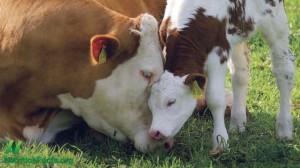This is Part 3 of my series on milk. You can read the first two parts by clicking on the links below.
Milk Is One Of The Most Dangerous Proteins
Now on to Part 3:
Milk creates large people
Each mammal was designed to produce the milk best suited for its kind. When a cow has  a baby, it has a calf, not a horse or a rooster. God created all life to reproduce after its own kind. Milk, a part of the reproductive process, is for its own kind as well. Every species needs different nutrients, different balance ratios and absorption factors, and its mother was designed to produce these in perfect balance. Milk was created to feed similar flesh and blood. The old saying “You are what you eat” is right on in this case. Calves reach full maturity in one or two years and weigh in at 1,000-2,000 pounds. Humans take twenty-one years to reach 100-200 pounds! And you wonder why are children are larger with each generation.
a baby, it has a calf, not a horse or a rooster. God created all life to reproduce after its own kind. Milk, a part of the reproductive process, is for its own kind as well. Every species needs different nutrients, different balance ratios and absorption factors, and its mother was designed to produce these in perfect balance. Milk was created to feed similar flesh and blood. The old saying “You are what you eat” is right on in this case. Calves reach full maturity in one or two years and weigh in at 1,000-2,000 pounds. Humans take twenty-one years to reach 100-200 pounds! And you wonder why are children are larger with each generation.
Digestion of milk
The human body stops making lactase, the main enzyme needed to digest milk, between one-and-a-half and four years of age. Lactose is one of the two sugars in milk. When the enzyme lactase is not present to break down this sugar, so the sugar is sent to the large intestine, where inhibiting bacteria ferment the lactose. This causes gas and lactic acid (a poison). This, in turn, draws water to the area through the process of osmosis, and you may get water retention, bloating, heavy gas, diarrhea, and many of the symptoms we will mention later on. Dr. Joyce Gryboski, Director of Pediatrics at the University of Yale School of Medicine, says that at least one child per week is brought in with symptoms that are nothing more than milk allergies.
Protein is perhaps the biggest attraction for the use of milk. Strong, healthy bones, well-developed muscles and great skin: they’re nothing but a sales pitch. The milk producers are good salesmen, and the concept is so programmed in people’s minds they never think twice. If you are having a hard time deciding whether you should stop drinking milk immediately, even with the facts I have already provided, you might be one of those programmed people. The fact is, milk protein does not digest. The protein globules are too big for our livers to digest; the ill effects of undigested protein have been made clear before this point. Dr. Schroeder found that skim milk has lost virtually all the chromium and manganese, both of which are needed to metabolize its two main ingredients, protein and sugar. And here you thought skim milk was better. The advertisers don’t care about your health, just your money.
Fat is another of the great offenders in milk. To start with, the fat globules are too large to digest by the human liver. The human liver is only one-sixth the size of a cow liver. Secondly, three fatty acid molecules combine with one glycerin molecule to produce triglycerides, 95-96% of milk fat, and high triglycerides are related to artery plaque. 60% of milk fat is saturated fat, the “bad” fats looked for in cholesterol screenings. Has your doctor ever told you to get off milk when you failed to pass your cholesterol test? If he even knew to tell you this, you would still find that milk is practically unavoidable as noted if you check the labels.
Milk feeds infection
Dr. Frank A. Oski, MD, states that streptococcal pharyngitis (bacterial-related allergies that may cause bronchitis, strep, asthma, and other symptoms) becomes practically extinct without milk protein. This is true because galactose (the other milk sugar) is slow-absorbing, which allows a growth of bacteria in the intestinal tract. High amounts of protein without balancing factors, be they milk or any food protein, may cause premature development of some body parts. This causes an imbalanced anatomy, one of the most serious being poor joint development. The milk producers tell you the opposite, that milk is good for growing and developing bodies.
Stay tuned for the next and final installment of this series on milk where I will talk about milk alternatives!
